Preparation
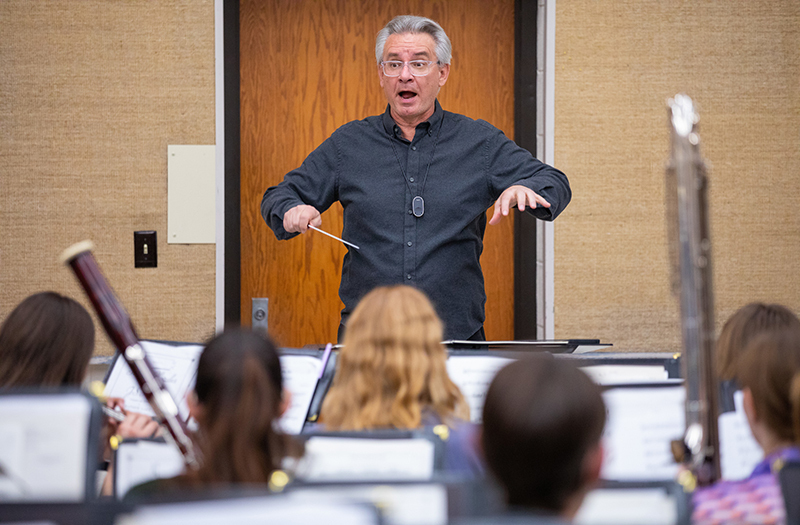
Photo by Christopher Gannon.
Michael Golemo, University Professor of music and director of bands, conducts the Wind Ensemble during its assigned class period Monday in Simon Estes Music Hall. The group was rehearsing "The Fly" by composer Oscar Navarro, who intended it to emulate the sounds produced as a fly travels across the various sections of a band. Imagine that for a moment.
The Wind Ensemble's spring concert is Friday, April 21 (7:30 p.m., Recital Hall, Estes Music Hall). It will be livestreamed on the Recital Hall webcast site.
Signing day for admitted students is April 7
Iowa State's second annual Admitted Student Day (Friday, April 7) has drawn about 65% more prospective students than the university's inaugural event last spring. With family members along to help size up campus, total guests -- more than 2,000 -- would double last year's attendance.
All of the 800-plus students visiting April 7 have an admissions offer from Iowa State, and more than half -- about 450 -- have yet to make their college decision. The others have committed to Iowa State, but perhaps delayed their official visit to campus until spring. For most, this will be their first time on campus, which makes it an impactful, useful day. Emili Johnson, assistant director for reporting and project management in the office of admissions, said a majority of the visitors are traveling from outside of Iowa and as far away as Oregon, Washington, D.C. and Puerto Rico.
May 1 is coming
Admitted Student Day, scheduled prior to the May 1 national college decision day, is a strategy to bring to campus students with an admissions offer. Getting commitments ahead of the May 1 date helps everyone, according to Johnson. Students who make their decision "can enjoy the end of their senior year." Iowa State has more time to prepare for their arrival -- at orientation in June and for fall semester in August.
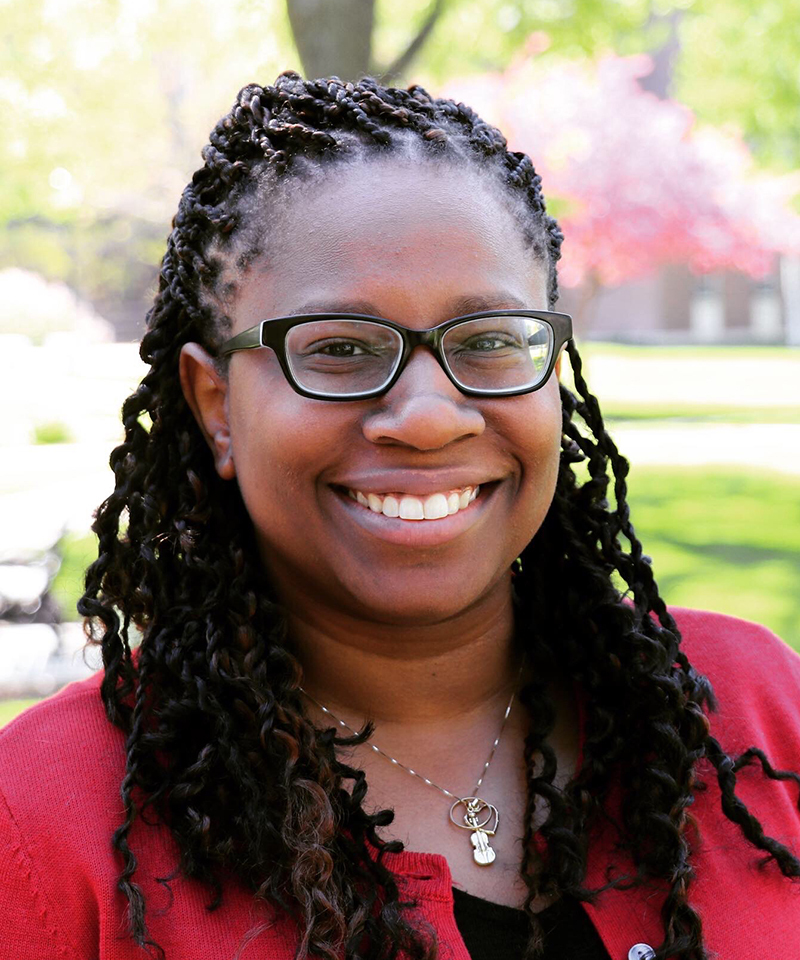
Emili Johnson
"We wanted a big-push event that really encourages students to become Cyclones," Johnson said. "This is a best-of-the-best day where we roll out the red carpet. All the colleges are involved and showcase their programs and academic tracks. Units that focus on student services are involved to let these students and families know 'These are the things we do at Iowa State to make sure you have an amazing Cyclone experience.'"
Johnson expressed her gratitude to the nearly 300 Iowa Staters -- students, academic affairs and student affairs staff, faculty and recent alumni -- who have important roles on Admitted Student Day. They'll lead more than 200 discussions and demonstrations, staff a resource fair and provide campus walking tours.
Scheman Building at the Iowa State Center will be the check-in site for Admitted Student Day, and all visitors will start the day at a 9 a.m. welcome session and young alumni keynote panel in Hilton Coliseum. Coach buses will transport visitors between the Iowa State Center and central campus via Lincoln Way to the west side of the Memorial Union.
Sign with Cy
Students who decide to accept their offer of admission Friday can head to a special booth at the front of the ISU Book Store in the Memorial Union (11 a.m.-2 p.m.). Design students who studied calligraphy will personalize a certificate of intent for each new student, and Cy will be on hand as a silent and supportive witness when they sign it.
Hope it's a great day
Johnson encouraged the campus community to be alert to the more than 2,000 visitors on campus and show their Cyclone spirit by wearing Iowa State gear. New students will be identifiable by lanyard name badges.
"Think back to your first experience on our Iowa State campus," she said. "Ask guests if they need any assistance.
"It's a big day. I hope it's a great day for our prospective students and their families," she added.
Welcome
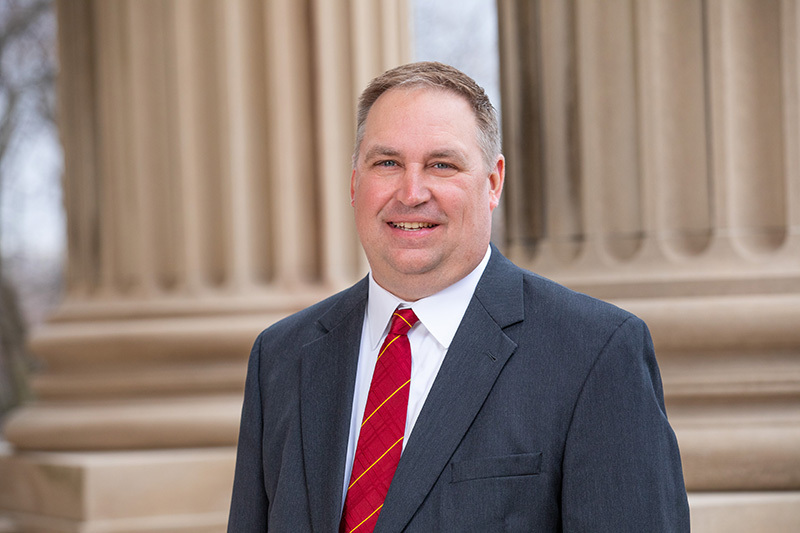
Iowa native Jason Henderson began as vice president for ISU Extension and Outreach on April 3. Photo by Christopher Gannon.
Jason Henderson began as vice president for ISU Extension and Outreach on April 3.
Henderson comes to Iowa State from Purdue University, West Lafayette, Indiana, where he served as director of extension and senior associate dean for faculty development in the College of Agriculture and assistant vice provost for engagement. From 2007 to2013, Henderson was the vice president and Omaha branch executive for the Federal Reserve Bank of Kansas City.
Henderson holds a bachelor's degree in economics from Central College, Pella, and master's and doctoral degrees in agricultural economics from Purdue University. He is from Arlington, Iowa, and grew up on a dairy farm.
Henderson's office is in 2150 Beardshear. He can be reached by phone at 294-6675, by email at jhender5@iastate.edu.
Henderson succeeds John Lawrence, who retired April 2 and had served in the post since 2018.
Search launches for Ames National Laboratory director
Iowa State University has launched the search for the director of the U.S. Department of Energy (DOE) Ames National Laboratory. The successful candidate will succeed Adam Schwartz, who announced last month he will step down from the role.
Ames National Laboratory, one of 10 laboratories under the DOE's Office of Science, is administered by Iowa State University under contract from the DOE. The laboratory is a global leader in materials science, including critical materials, next-generation refrigeration and recycling of plastics and rare earth metals. Many of its scientists also hold academic appointments, most notably in physics, chemistry and engineering disciplines.
"Serving as director of the Ames National Laboratory is an excellent opportunity for top scientists and research leaders," said provost Jonathan Wickert. "I am confident we will find a director who will build upon the momentum created by Adam Schwartz and the laboratory's team."
Peter Dorhout, vice president for research and member of the Ames National Laboratory Oversight Board; and James Morris, the laboratory's chief research officer, co-chair the search. Other members of the committee are:
- Chelsey Aisenbrey, director of laboratory planning and performance, Ames National Laboratory
- Nicolas Argibay, scientist IV, Ames National Laboratory
- Kelly Bergman, program specialist III, Ames National Laboratory
- Chris Cornelius, professor and chair, materials science and engineering
- Rebecca Flint, associate professor, physics and astronomy
- Jennifer Lohrbach, senior manager, Ames National Laboratory information technology systems
- Robert McQueeney, professor, physics and astronomy; and Ames National Laboratory
- Ikenna Nlebedim, scientist III, Ames National Laboratory; and adjunct assistant professor, electrical and computer engineering
- Aaron Rossini, faculty scientist, Ames National Laboratory; and associate professor, chemistry
- Beate Schmittmann, dean, College of Liberal Arts and Sciences
- Emily Smith, division director, chemical and biological sciences, Ames National Laboratory; and professor, chemistry
- Sean Whalen, director, safety and security, Ames National Laboratory
- Lin Zhou, associate professor, materials science and engineering
Russell Reynolds Associates is supporting the committee's efforts to cast a wide net in searching for the director. A website for the search will go live in the coming weeks.
Military-Affiliated Student Center fosters success and community
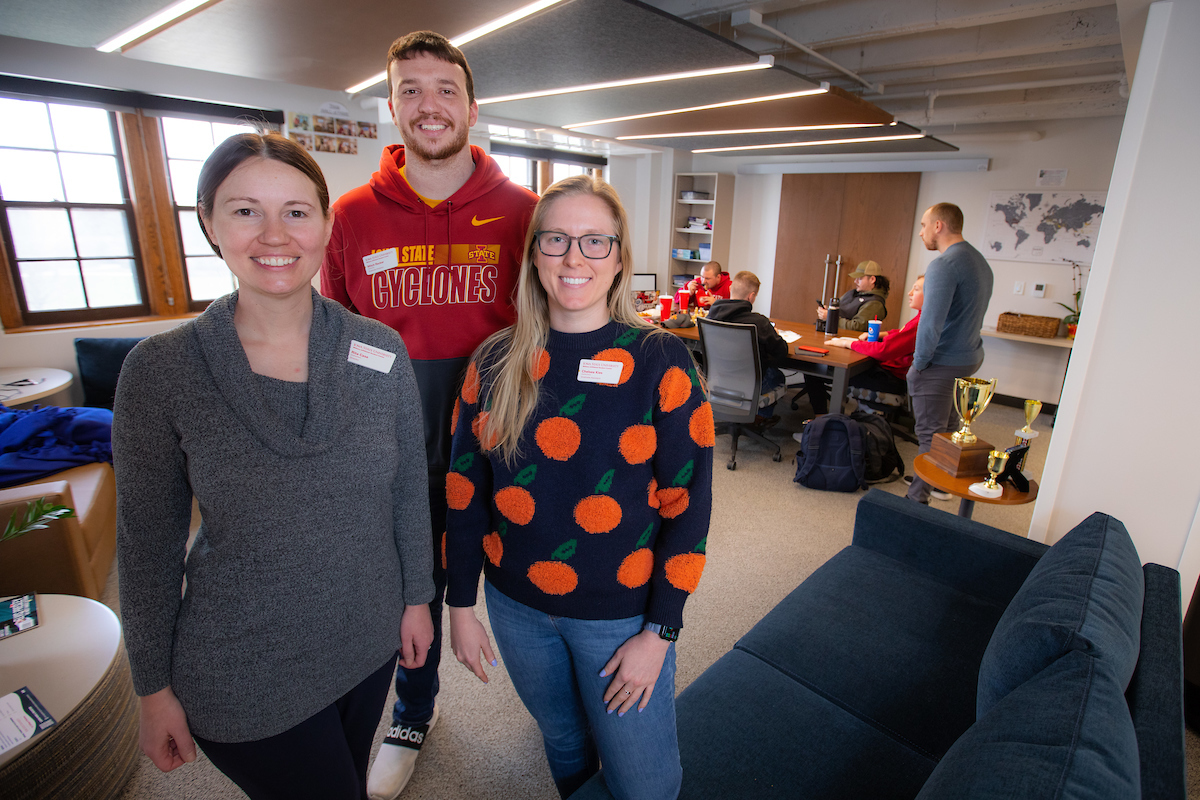
Rita Case, left, director of the Military-Affiliated Student Center, with staff members Mitch Recker and Chelsea Kies. Students enjoy fellowship and lunch behind them in the MASC. Photo by Christopher Gannon.
Supporting student veterans is at the heart of the Military-Affiliated Student Center's (MASC) mission, and celebrating the accomplishments of those students is one of director Rita Case's favorite parts of the job.
"Veteran graduations are my absolute favorite events each year," said Case, who came to Iowa State in 2021. "I know that the students enjoy a moment of getting to be proud of their accomplishments, and I also know that it is inspiring to other students to see their friends crossing the finish line to get their degree."
Earning their degree is an important moment for any student, especially for veterans and military-affiliated students. Though the number of veterans pursuing college degrees has steadily increased thanks in part to the GI Bill and efforts to recruit and retain military-affiliated and veteran students nationwide, veterans and students in the military still face unique obstacles on the way to graduation. The MASC is striving to change that by offering support, resources and community.
Military friendly
Iowa State recently received a Gold ranking from the Military Friendly Schools survey and was named a Military Friendly School for 2023-24. Metrics for the ranking include graduation and retention rates along with social-based criteria like programming and recognition for military-affiliated and veteran students.
ISU was one of approximately 1,800 institutions nationwide to meet the qualifications for the Military Friendly designation and one of the 27 large universities to be ranked Gold, a denotation that represents the top 10% of schools on the list. Iowa State currently serves more than 800 military-affiliated students, and Case said most are from Iowa and the Midwest.
Case says there always is more work to be done to be the best at serving military-affiliated students, but it's nice to see efforts reflected back in the survey data.
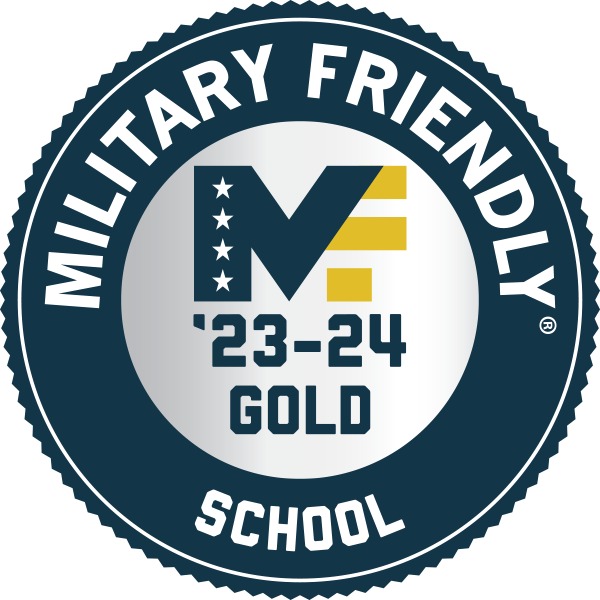
Iowa State was named a 2023-24 Military Friendly School. Image provided by Military Friendly.
"I appreciate the Military Friendly award because it goes beyond the work that the MASC does for this student population and is more reflective of all the work across campus that goes into making our students successful," she said.
Supporting students
Formed in May 2012, the then-Veterans Center initially focused on assisting recently transitioned combat veterans from Iraq and Afghanistan who often were older students seeking not only education but accessibility and mental health services. While "veteran" implies a person has completed at least one active-duty enlistment term and is no longer serving in the military, Case said it doesn't reflect the currently serving National Guard and Reserve members as well as the ROTC cadets and direct family members of those in the service who also receive support at the MASC. This consideration inspired the center's name change in 2022.
"The focus now is more on access to academic services and career transition. With the change in our student demographic, a change of name was needed to be more inclusive of all the students that we serve," Case said.
In addition to offering academic support and assistance with navigating scholarships and financial aid, the MASC acts as a conduit for connection with Thursday Night Dinners, weekly trivia and study spaces where students can help each other with coursework. Cultivating this community can be crucial for veterans, who often cite isolation among the challenging aspects of transitioning to civilian life, as well as students currently serving.
Case said faculty in particular can help support the more than 200 students currently serving in the Iowa National Guard by encouraging communication and offering flexibility.
"Military students want to be treated the same as everyone else in the classroom. But faculty can still support these students by understanding that training may occasionally land during classroom hours and the student has no control over the timing," Case said.
Forever true
The mission of the MASC is close to Case's heart as a veteran of the United States Navy and Navy Reserves who started working with veterans in higher education a decade ago as a student employee helping process GI Bill claims while pursuing her own bachelor's degree in Colorado. She was drawn to Iowa State after visiting campus and seeing Gold Star Hall -- a monument recognizing Iowa State students who died in service and the reason for the "memorial" in the building's name, Memorial Union.
"I fell in love with Gold Star Hall," Case said. "Knowing that ISU students worked so hard to make the Memorial Union building a reality to honor their classmates lost serving in World War I was physical proof to me that Iowa State University cares about those who have served."
New program spotlights P&S employee excellence
University human resources (UHR) has created a new way to recognize outstanding work by Professional and Scientific (P&S) employees -- the Spot Award Program.
Presented to individuals with excellent performance or a notable accomplishment, the Spot Award rewards P&S employees for short-term or responsive work that goes beyond normal expectations for their position. The program launched on April 1.
Award details
Ranging between $50 and $500, the Spot Award is a taxable, one-time payment. Spot Awards are not to be used as a substitute for ongoing performance-based salary adjustments or to supplement base pay. The awards can be given at any time during the fiscal year, and a P&S employee can earn a Spot Award up to three times per fiscal year.
Spot Awards can be given to a current regular or emergency P&S employee -- term or continuous and full or part time -- who has worked at Iowa State in a P&S position for at least three continuous months at the time of the award. The employee does not need to have a current performance evaluation on file. Funding for the award can be provided by the employing department, a non-employing department or jointly by employing and non-employing departments.
Learn more
Visit the UHR Knowledge Base for more information about the Spot Award and EMPP.
Another tool for recognition
"The intention in creating this additional program is to give managers another tool in their box to reward and recognize efforts of varying impact," said compensation analyst Whitney Grote. "Recognition can help foster a culture in which employees feel valued, are engaged in their work and are motivated to perform."
A complement to the Extra-Meritorious Performance Pay (EMPP) Program, the Spot Award offers flexibility, less restrictive eligibility requirements and a simplified approval process. Opportunities to consider a Spot Award can include:
- Completion of a special or significant project by an individual or group of employees
- Recognition for earning certifications related to their position
- Leading a project or committee
- Supporting student, faculty or staff needs in a crisis situation
Once the award has been approved, supervisors or nominators can let the employee know about the recognition. The award payment is processed in Workday and will be applied to an employee's scheduled paycheck.
Spot Award vs. Extra-Meritorious Performance Pay
Like the Spot Award, the EMPP recognizes exceptional performance or a specific accomplishment that exceeds expectations, includes a one-time payment that's not added to base salary and is not a substitute for ongoing performance-based salary adjustments. However, there are a few key differences between the two programs.
- P&S employees may receive an EMPP multiple times per fiscal year, but the total cannot exceed 10% of their base salary. Spot Awards also can be given at any time during the fiscal year up to three times.
- EMPP can be awarded to any regular current employee -- term or continuous and full or part time -- who has served in a P&S position at the university for at least one continuous year at the time of receiving the EMPP. Current regular and emergency P&S employees who have served at least three continuous months are eligible for a Spot Award.
- The P&S employee must have a satisfactory performance evaluation on file from within the past 12 months for EMPP. A performance evaluation is not required for the Spot Award.
Faculty and merit
EMPP and Spot Awards are for P&S employees, and faculty have a similar initiative called the Faculty Exceptional Performance Pay Program. Merit employees also have a Pay for Exceptional Performance program outlined in the Merit System rules.
Transition to new research proposal system begins in July
In July, Iowa State will roll out the Streamlyne proposal development and routing system to replace the GoldSheet, Cardinal Sheet, Liquid Office and Cayuse systems.
After more than 20 years of service, the current proposal and development system is antiquated and inadequate for helping principal investigators (PIs) meet the requirements of an ever evolving and increasingly complex research proposal environment. In addition, the current system presents ongoing agility and maintenance challenges.
The office of the vice president for research (OVPR) and the office of sponsored programs and administration (OSPA) -- in collaboration with the colleges and user groups -- began defining the expectations for an enhanced proposal development and routing system in 2019.
"Our goal was to identify an improved, multifaceted system that would grow and evolve with the changing needs of our research community and be viable for years to come," said OSPA director Becky Musselman.
After reviewing several industry-leading options, the project team selected Streamlyne Research, an electronic Research Administration (eRA) software with interconnected modules, cloud-based security and industry-leading uptime.
"Our transition to Streamlyne and our changes in process are being made to ensure that we have the systems in place to help our PIs deliver successful proposals that review well and stand up to evolving and increasing sponsor scrutiny," said vice president for research Peter Dorhout. "With change comes challenges. But through every step of the process, our service-minded team has kept PIs' perspectives top-of-mind while making the necessary and purposeful changes needed to continue to advance the Iowa State research enterprise."
Phase 1 implementation
The first phase of implementation, beginning this July, will enable pre-award proposal development and pre-award institutional proposals for both sponsored funding and gifts to co-exist in one cohesive system. The proposal development module allows collaborative development of a proposal, including the collection of data and attachments required for approvals, reporting and tracking. The institutional proposals module provides for institutional recordkeeping of proposals submitted and agreements requested (for example, a Material Transfer Agreement, Memorandum of Understanding or Nondisclosure Agreement). In addition, Streamlyne is a certified Workday integration partner.
The move to Streamlyne means GoldSheets, Cardinal Sheets and Cayuse System-to-System (S2S) proposals for Grants.gov will be replaced with a single system that will:
- Reduce the number of systems PIs need to learn and use.
- Decrease duplicate entries.
- Enable PIs to view, save and retain proposal attachments in a single location.
Additional Streamlyne benefits for PIs include:
- Viewing proposals at any time once they have been initiated.
- PIs and co-PIs may approve proposals at the same time without having to wait for the prior approver to authorize.
- Files for submitted proposals will be saved and accessible in Streamlyne to help create accurate lists of current and pending support.
- Tracking where their proposals-in-routing are in the workflow and approval process.
- The ability to sort proposal listings by various criteria including sponsor, title, project, status, lead unit, deadline date, grants.gov opportunity number or initiator.
- The ability to copy proposal records -- including budgets and attachments -- in order to initiate new proposals.
- Improved and more convenient budget development possible due to the system's ability to automatically load a research team member's salary and benefits when the individual's name is entered.
- Store multiple budget drafts for a single project.
- Co-PIs, in addition to PIs, can document proposal financial responsibility by responsible person.
Changes to routing deadlines
In order to help PIs meet sponsor requirements, a change in routing deadlines is being implemented to ensure proposals conform with the ever-changing requirements of funding opportunities. With Streamlyne, a new initial review process will be used for all sponsored project budgets. All sponsored project budgets will be reviewed and approved before final proposals are routed internally for ISU approvals. This means two firm proposal deadlines will be in place: one for submission of the budget to OSPA for review; the other for routing the proposal documents for approval.
The Streamlyne system currently is being tested by an ISU project team and the Campus Super-User Group comprised of proposal development staff from the College of Agriculture and Life Sciences/Ag Experiment Station (CALS/AES); the colleges of Engineering, Human Sciences, Liberal Arts and Sciences and Veterinary Medicine; Extension and Outreach and the Grants Hub.
A system pilot will begin in May with CALS/AES and the College of Human Sciences. Training opportunities for all PIs will be offered prior to the July 5 go-live date. Additional information on the new Streamlyne system, including an FAQ, is online.
Eighty-two courses meet updated diversity requirement
U.S. Diversity Course Requirement Committee chair Kelly Reddy-Best updated the Faculty Senate on its progress during the senate's April 4 meeting. As of March 31, 82 of the 105 submitted courses had been approved, providing more than 8,000 seats for the upcoming academic year. Nine courses were rejected and the remaining are awaiting review.
"There was a concern early on that there were enough seats to satisfy the needs of students, but it is now clear we will have enough for an academic year," Reddy-Best said.
The committee has worked since September to determine if submitted undergraduate courses satisfy the updated U.S. diversity course requirement by meeting at least three of the four learning outcomes in a minimum of 70% of the course. The committee looks at the course proposal, the syllabus and a learning item -- quiz, chapter, assignment, etc. -- to determine its eligibility.
Students enrolled in the 2022-23 catalog or earlier still can take current diversity courses to satisfy the requirement. All courses approved this academic year can be used by students who enroll on the 2023-24 catalog. The courses are listed separately on the registrar's website and updated when new courses are approved.
Students who transfer to the university can have the committee review their completed courses to determine if a course meets the diversity course requirement.
"We have identified the top 29 transfer courses students are bringing in," said Ann Marie VanDerZanden, associate provost for academic programs. "We will establish our process and get a decision on the majority of those and handle the rest as a one off."
Instructors must submit courses by April 12 for committee review, but no more than 16 total will be considered, Reddy-Best said. Decisions to be considered in the future will include:
- Expanding offerings in departments and colleges
- Determining how often approved courses are reviewed
- Establishing an annual deadline for proposed courses
Discontinue
Senators will vote at their April 18 meeting on discontinuing the bachelor's degree in speech communication in the College of Liberal Arts and Sciences. The major focuses heavily on rhetoric, which isn't as valuable in the workplace as competing majors like communication studies. The English department will save more than $75,000 by eliminating the 10 courses associated with the major.
Other business
Senators voted to:
- Remove duplicate definitions regarding faculty conduct from one of two sections in the Faculty Handbook.
- Add language to the Faculty Handbook to ensure tenure and term faculty are eligible for Distinguished, University and Morrill Professorships. Changes to term faculty titles made years ago are not reflected for these honors or ISU's idea of one faculty. All faculty who reach the highest level of advancement could be nominated and the criteria for the titles remain the same.
- Discontinue the bachelor of science in biophysics in the College of Liberal Arts and Sciences. The meaning has shifted over decades, and the learning objectives align closely with a biochemistry degree with a biophysics specialization.
P&S staff receive 2022 CYtation Awards
Forty-four employees received the Professional & Scientific (P&S) Council CYtation Award for their outstanding work and contributions in 2022. The 16 individuals and three teams from across the university were honored at a breakfast ceremony March 23 at the ISU Alumni Center.
The CYtation awards recognize P&S employees, particularly those who might not otherwise receive public recognition, who go above and beyond the call of duty, do something extraordinarily well, and act in such a way as to make a real difference in the institution. More information about the recipients is on the council's website.
Council president Jamie Sass, president-elect Patrick Wall and past president Chris Johnsen presented the awards. Jackie Woodin introduced the Woodin CYtation Award, created in memory of her husband and former council member Dan Woodin, to recognize a career of dedication and service to Iowa State. Recipients receive a framed certificate and a gift donated by one of the council's ISU partners: ISU Athletics, ISU Book Store or Reiman Gardens.
CYtation award nominations open in October. Individual awards recognize an achievement within the last two years, and team nominations recognize achievement within the last year.
Professional and Scientific Council Woodin CYtation Award recipient
- Amy Lewman, administrative assistant, ecology, evolution and organismal biology
Professional and Scientific Council CYtation Award recipients
- Karen Bramow, project manager, office of the vice president for research
- Cris Broshar, child Care & family services coordinator, university human resources
- Anindita Das, diversity, equity and inclusion strategist, College of Design
- Alexa Groff, 4-H Youth STEM program specialist, 4-H youth development
- Brad Hill, associate director for operations, Memorial Union
- Samantha Hirschman, graduate student services specialist, Graduate College
- Claire Kruesel, student services specialist, biochemistry, biophysics and molecular biology
- Liz Luiken, assistant director, dean of students office -- office of student conduct
- Gene Manhattan, international student advisor, international students and scholars office
- Ashley Morton, academic advisor, Engineering student services
- Cindy Osborne, manager, custodial services, recreation services
- Sadi Reimann, administrative assistant, School of Education
- Johna Wolfe, student services specialist/classification coordinator, LAS student services
- Svitlana Zbarska, campus-wide undergraduate research program coordinator, Honors program
Outstanding New Professional and Scientific Council Member CYtation Award recipient
- Anindita Das, diversity, equity and inclusion strategist, College of Design
Professional and Scientific Council CYtation Team Award recipients
- CIRAS Salesforce implementation team: Leah Barton, Tina Colburn, Jodi Essex, Jennifer Garcia-Velazquez, Chris Hill, Gayle Mastbergen, Jennifer Meseke, Tracy Schuster and Chris Thach
- Pappajohn Center for Entrepreneurship team: Alex Andrade, Sam Dilocker, Judi Eyles, Megan Graettinger, Peter Hong, Hannah Kirkendall, Ashley Sawyer, Tom Swartwood and Jean Walsh
- Strategic facilities planning team: Katie Baumgarn, Suzanne Fisher, Corinne Goode, Brandi Latterell, Sarah Lawrence, Alesha Magee, Kelly Nelson, Elizabeth Salton, Chris Strawhacker and Linda Tibbs
